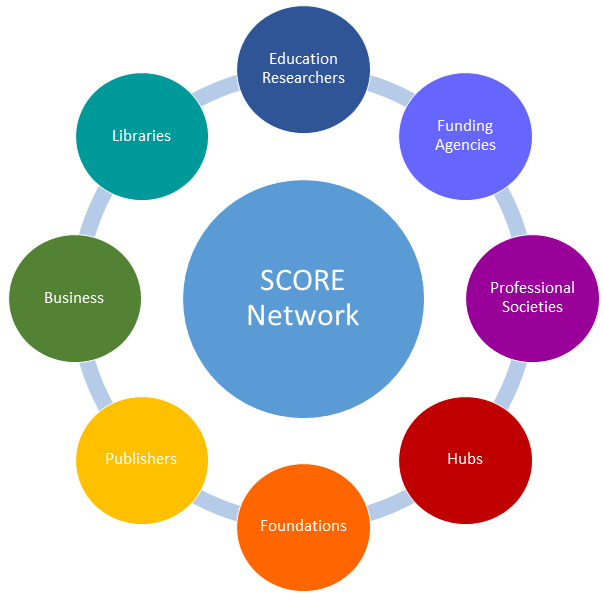The SCORE Summit 2019 Wrap-up!
Thank you to all of the many organizations, projects, and institutions which were able to join us for the Sustainability Challenges for Open Resources to promote an Equitable Undergraduate Biology Education (SCORE-UBE) meeting! This meeting was supported by an NSF DBI RCN-UBE grant, a funding mechanism meant to convene a diverse set of stakeholders to explore problems in undergraduate biology education. At the SCORE conference, we examined the “promise of equity and the challenge of sustainability for open educational resources in undergraduate biology education.” Many impactful open education projects have been developed in the past several years, including by the members of our network, but it has become clear that maintaining the infrastructure of these projects beyond the life of the grant is very difficult.
The full meeting report prepared by our Evaluator, Robin Taylor, PhD, is now available.
Meeting Structure
-
We started the meeting with a poster session to showcase the wide variety of projects represented at the meeting.
-
Dr. Karen Cangialosi of Keene State College presented the opening keynote address. This talk helped set definitions and values of Open Educational Resources (OER), Open Pedagogy (OP), Open Educational Practices (OEP), and the pedagogy of open science. It also laid out compelling financial reasons for both students and institutions to use OER, and presented evidence demonstrating gains in student learning resulting from adoption of OER and OEP among all students, and especially Pell grant-eligible students. These results suggest that OER may be particularly beneficial to marginalized populations, though data on other groups is still forthcoming.
-
Dr. Joseph Garcia facilitated sessions on organizational function, structure, and sustainability as well as value propositions and fixed/infrastructure versus variable/innovation funding. These sessions also included a setting of common terminology as well as presentations from projects at different life cycle stages.
-
We hosted a Support and Funding Resources panel that brought together perspectives from deans, libraries, federal funding, and private funding.
-
We included three breakout sessions with topics suggested by the participants around convergent issues in the OER space for undergraduate biology education. The first sessions were exploratory, the second sessions articulated needs, and the third session focused on creating collaborations.
-
We concluded the meeting with brainstorming around clear and compelling needs for the network and the work a network could help accomplish. This conversation included drafting an optional common mission statement for the SCORE-UBE Network.
SCORE-UBE Mission Statement
A learning community supporting the use of OER to transform undergraduate biology education to be fully inclusive and support learning for all. This requires including people from other disciplines and fields of study in our network, and learning from what works and contributing our experience and knowledge back to these other fields. Our scope includes facilitating needed sharing within and beyond biology education, collective research, infrastructure, standards, outreach and processes.
Emergent themes
-
There is an emergent equity and social justice mission of our organizations at the intersection of OER in undergraduate biology and we should each have our respective organizations to revise their missions to articulate it.
-
How can using Open Educational Practices (including OER adoption, creation, and Open Pedagogy) in biology education promote social justice, equity, and inclusion? We need to clearly articulate what Open Education Practices (OEP) contribute to improving learning and faculty practice and we need to assess and fill gaps in what we know about OEP in the context of Discipline-based Education Research (DBER).
-
Financial stability requires a diverse portfolio and is the responsibility of many sectors from private and non-profit to local and federal government.
-
We need to collaborate across these worlds and continue conversations to understand what shared infrastructure would help us create and sustain OER resources.
-
Faculty are largely underutilizing institutional support for OER, in part because they don’t realize that libraries and deans are interested in supporting OER.
-
How can we continue to build community transformation around OEP throughout multiple sectors?
-
"Open washing;” The language of open education is being co-opted by industry/publishers. This is a huge problem as Open Resources that are only open through rental are “organizational waste” of resources instead of “organizational benefits.”
-
Understanding the life cycle of an OER organization. Organizations must adapt and reinvent themselves in order to remain relevant and sustainable.
Figure from: https://adaptivealternativesconsulting.com/2017/08/08/using-tcc-groups-ccat-nonprofit-strategic-planning/
Opportunities
-
Join the SCORE network! Contribute to solutions, help direct where we go next! See what cool projects are going on and be alerted to new collaborative opportunities, discussions, and partner news.
-
OpenStax Webinar - Diversity and Representation in Textbooks - November 20th - 11 am (CST) More Information and Registration
-
-
Talk within institutions to teaching and learning centers, deans, and libraries. These groups/people might be able to support your work if they know about it.
-
Ask your institution to revisit its mission in light of equity, diversity, inclusion, and social justice. Bring the SCORE-UBE mission back to your organization as a starting point (contact Pat Marstellar for additional information - pmars@emory.edu).
-
Participate in OER research. Clear research questions are available - for example: how does OER affect faculty practice and student learning? (contact Kaitlin Bonner for additional information - kbonner@sjfc.edu).
-
Contribute to and support the SCORE network - Opportunities exist for addressing the future of the network, asset mapping, thinking about common infrastructure needs (contact Michelle Smith - mks274@cornell.edu), synthesizing what’s working across the network, and creating a support resource for OER projects (contact Carrie Diaz Eaton - cdeaton@bates.edu).
-
Explore any of these topics informally, meeting monthly or biweekly by Zoom (contact anyone listed above)
Resources
SCORE Meeting Evaluation Report
Posters presented during the Thursday poster session describing projects represented at the Summit
Links to Presentations from Funding Panel and Organizational Life Cycle Sessions
See the group of community resources for recommended readings, links to projects represented at the meeting, and more!
